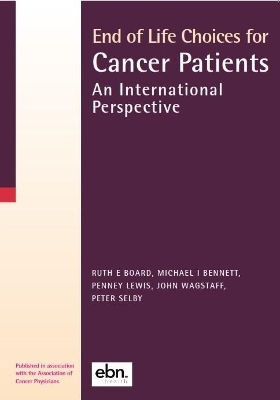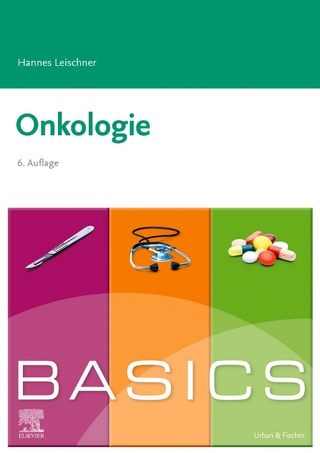
End of Life Choices for Cancer Patients
An International Perspective
Seiten
2020
EBN Health (Verlag)
978-0-9955954-4-6 (ISBN)
EBN Health (Verlag)
978-0-9955954-4-6 (ISBN)
- Titel nicht im Sortiment
- Artikel merken
This work brings together contributions on end of life choices from experienced professionals from oncology disciplines, palliative care, law, nurses and professions allied to medicine. The collection contributes to thinking about how to support and care for cancer patients at the end of their lives.
There have been impressive improvements in the diagnosis and treatment of cancer in recent decades. In economically advantaged countries with well-developed healthcare systems over 50% of all cancer patients achieve long term survival and are probably cured. Not only has survival improved radically for cancer patients but also there has been an increasing focus on the quality of patient's lives, on improving the patient experience of care and on developing effective support for the very many cancer survivors.
Despite the progress in cancer treatment, unfortunately a substantial number of cancer patients will still ultimately die of their disease. For many this will follow periods of successful treatment which results in good remissions and good quality of life. Helping patients to make the right choices about their care towards the end of their lives is one of the greatest and most challenging responsibilities of all healthcare professionals.
Legal change on the provision of assisted dying by healthcare professionals has occurred in a substantial number of jurisdictions. This work brings together contributions on end of life choices from experienced professionals from oncology disciplines, palliative care, law, nurses and professions allied to medicine. The goals are:
*To better inform cancer care professionals and the wider community about developments in choices in end of life care for cancer patients internationally.
*To better answer questions from patients and respond to requests from patients, including questions about and requests for assisted dying in countries where it is legal to do so.
*To have a balanced and well informed dialogue about choices available to patients without developing a formal policy position on change in law.
*To provide a basis of information for future educational activities.
There have been impressive improvements in the diagnosis and treatment of cancer in recent decades. In economically advantaged countries with well-developed healthcare systems over 50% of all cancer patients achieve long term survival and are probably cured. Not only has survival improved radically for cancer patients but also there has been an increasing focus on the quality of patient's lives, on improving the patient experience of care and on developing effective support for the very many cancer survivors.
Despite the progress in cancer treatment, unfortunately a substantial number of cancer patients will still ultimately die of their disease. For many this will follow periods of successful treatment which results in good remissions and good quality of life. Helping patients to make the right choices about their care towards the end of their lives is one of the greatest and most challenging responsibilities of all healthcare professionals.
Legal change on the provision of assisted dying by healthcare professionals has occurred in a substantial number of jurisdictions. This work brings together contributions on end of life choices from experienced professionals from oncology disciplines, palliative care, law, nurses and professions allied to medicine. The goals are:
*To better inform cancer care professionals and the wider community about developments in choices in end of life care for cancer patients internationally.
*To better answer questions from patients and respond to requests from patients, including questions about and requests for assisted dying in countries where it is legal to do so.
*To have a balanced and well informed dialogue about choices available to patients without developing a formal policy position on change in law.
*To provide a basis of information for future educational activities.
Introduction and Summary, An oncology perspective on choices at the end of life for cancer patients, How do permissive regimes regulate assisted dying?, Patients, physicians, and law at the end of life in England and Wales, Assisted dying in Canada: Lessons from the first three years, The provision of palliative care in the UK: how does the research evidence compare with current practice?, A palliative care perspective on choices for end of life care for cancer patients, Conclusions.
| Erscheinungsdatum | 11.11.2019 |
|---|---|
| Verlagsort | Witney |
| Sprache | englisch |
| Maße | 156 x 234 mm |
| Themenwelt | Medizin / Pharmazie ► Medizinische Fachgebiete ► Onkologie |
| Medizin / Pharmazie ► Medizinische Fachgebiete ► Palliativmedizin | |
| ISBN-10 | 0-9955954-4-5 / 0995595445 |
| ISBN-13 | 978-0-9955954-4-6 / 9780995595446 |
| Zustand | Neuware |
| Haben Sie eine Frage zum Produkt? |
Mehr entdecken
aus dem Bereich
aus dem Bereich
Korrigierter Nachdruck 2020 mit allen Ergänzungen der UICC aus den …
Buch | Softcover (2020)
Wiley-VCH (Verlag)
42,90 €
Resilienz innovativ stärken : ein Praxishandbuch
Buch | Softcover (2023)
Kohlhammer (Verlag)
36,00 €


